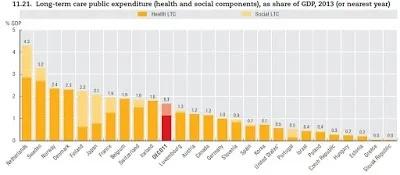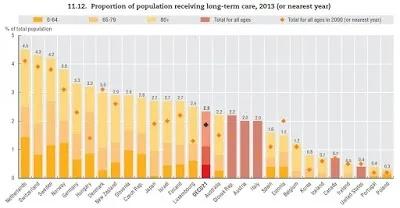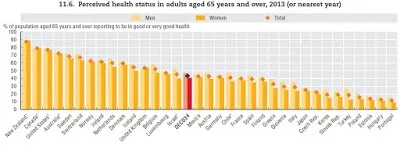
Can the US Continue to be an Outlier in Long Term Care?
As the population ages, it seems plausible that more people will rely on long-term care.
Such care could be delivered in a variety of ways: for example, within their own home, or a specialty adapted house where care is available 24/7, or or in an institutionalized setting, and by some mixture of paid providers, volunteers, and family members. Compared with other high-income nations of the world, the US is something of an outlier when it comes to long-term care: spending less, fewer recipients of long-term care, as a result a healthier over-65 population. The figures below come from the OECD data book published a couple of years ago.
Here’s a figure showing public spending on long-term care as a share of GDP. The OECD average is 1.7% of GDP. The US spends 0.5% of GDP. The other countries that spend this little tend to have lower GDP per capita than the rest of this comparison group.


In turn, a main reason why the share of over-65 Americans receiving long-term care is so low is because, compared with other countries, the American cohort feels it’s in pretty good physical shape. In the US and Canada, about 80% of the over-65 population reports being in good or very good health. For comparison, less than half of the over-65 population in the other OECD countries is reported being in good or very good health.

It’s wise to take these kinds of international comparisons with a bit of skepticism. For example, the figure above shows public spending on long-term care. The Congressional Budget Office estimated that the value of informal care provided in the US without compensation by family and friends was slightly larger than the amount of paid-for care. But other countries presumably have some long-term care that is informally provided, too. One might also wonder if Americans (and Canadians) over-65 are actually in better health than their counterparts in other countries, or just more likely to say that they are in better health.
Trending
-
1 UK Tech Sector Secures a Third of European VC Funding in 2024
Azamat Abdoullaev -
2 France’s Main Problem is Socialism, Not Elections
Daniel Lacalle -
3 Fed Chair Jerome Powell Reports 'Modest' Progress in Inflation Fight
Daniel Lacalle -
4 AI Investments Drive 47% Increase in US Venture Capital Funding
Felix Yim -
5 The Future of Work: How Significance Drives Employee Engagement
Daniel Burrus





Comments